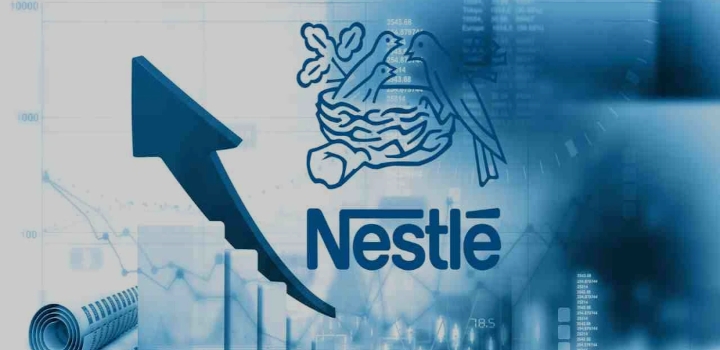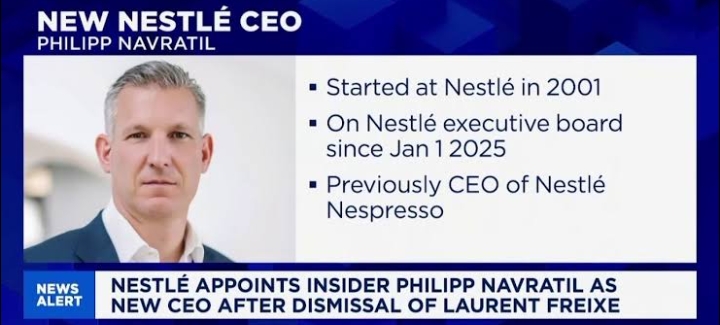Global markets started the week with contrasting headlines from Europe and the UK. Nestlé Crisis stunned investors by abruptly ousting its CEO Laurent Frix over an undisclosed personal connection, even though he had taken the helm just a year ago. The move shook confidence in the Swiss food giant, with its shares falling more than 3% and weighing on broader European indices. Meanwhile, in more good news, London-based fintech company Revolut achieved a record $75 billion valuation in a secondary share sale and delivered a long-awaited payout to employees. Together, the news highlights the deep gulf between legacy companies and fast-growing digital competitors.
Nestlé Crisis : Global markets opened the week with mixed fortunes as investors weighed corporate upheavals in Europe against a major milestone in the fintech sector. On one hand, Nestlé’s surprise CEO exit rattled confidence and pushed European stock indices lower. On the other, UK-based fintech Revolut surged to a $75 billion valuation, promising staff a windfall from a long-awaited secondary share sale.
The contrasting stories highlight the delicate balance shaping today’s markets: traditional consumer giants are struggling with leadership instability and sluggish demand, while digital-first companies continue to expand rapidly, pulling investor attention towards the future of finance and technology.
Nestlé CEO Ousted Amid Personal Scandal
Shares in Nestlé (NESN.SW) fell sharply after the company dismissed its chief executive Laurent Freixe just one year into his tenure. Reports confirmed that Freixe was removed for failing to disclose a personal relationship with a subordinate — a breach of corporate governance that comes at a sensitive time for the Swiss food giant.
The stock slid 3.2%, dragging the wider STOXX 600 index down 0.1% to 550.48 points by early trading. Nestlé’s troubles also pushed the Swiss blue-chip index lower by 0.3%.
The leadership shock adds to existing challenges for the KitKat and Nescafé maker, which is already navigating weak consumer demand and disruptive U.S. tariffs. Analysts warn the company could face further volatility as it works to restore investor confidence and steady its global operations.
Topics
European Indices React
The decline in Nestlé shares weighed heavily on the broader food and beverage sector, which saw a 1.2% drop across Europe. Still, not all stocks suffered.
Kering (KER.PA) rose 3.8% after HSBC upgraded the Gucci parent from “hold” to “buy.”
Partners Group (PGHN.SW) climbed 3.37% following solid first-half results.
Meanwhile, investors kept a close eye on the first inflation estimate for the eurozone in August 2025. Economists polled by Reuters expect prices to have risen by around 2%, reinforcing expectations of a slow but steady recovery across Europe.

Revolut’s $75 Billion Leap
In stark contrast to Nestlé’s woes, Revolut announced a huge jump in valuation, reaching $75 billion (£55bn) after launching a new secondary share sale. This marks a two-thirds increase from last year’s $45 billion valuation, underlining the fintech’s rapid growth and resilience.
The deal values shares at $1,381.06 each, making Revolut one of the world’s most valuable fintech companies. Crucially, the move isn’t just good news for investors — employees are set for a payout bonanza.
Under the terms of the sale, staff will be allowed to sell up to 20% of their personal shareholdings to both new and existing investors. Payments are expected to follow in early autumn, providing liquidity to employees who have held equity for years.

Profits and Growth Driving Momentum
Revolut’s rising valuation comes on the back of a stellar performance in 2024, when the company posted profits of £1 billion — more than 150% higher than the previous year. Growth has been fuelled by:
A surge in paid subscriptions.
Expanding revenue streams in wealth management and crypto trading.
Ongoing global expansion in retail and business banking services.
Founder and CEO Nik Storonsky has already benefited personally, reportedly pocketing between $200m and $300m from a previous share sale last summer.
If the company continues on its trajectory and pushes past a $150 billion valuation, analysts suggest Storonsky could be on track for a multibillion-dollar fortune.

IPO Speculation Grows
The secondary share sale has raised fresh speculation about Revolut’s long-delayed IPO plans. Employees gaining liquidity through private sales could indicate frustration at the lack of a stock market debut, according to some analysts.
Kathleen Brooks, research director at online broker XTB, said:
> “This could be a sign that the company will either IPO soon or that its employees are getting antsy about the lack of an IPO and want to release their equity rather than wait.”
However, Revolut has downplayed such speculation. A company spokesperson stressed that providing employees with opportunities to sell shares was part of its commitment to staff and declined to comment further on IPO timing.
Critics argue that if Revolut does eventually go public, it should list in London — but fears remain that the firm might choose New York, continuing the trend of UK-born tech giants seeking deeper capital markets overseas.—

A Tale of Two Markets
The divergence between Nestlé’s instability and Revolut’s meteoric rise reflects a broader theme in global markets. Established consumer brands are struggling with cost pressures, governance scandals, and shifting demand.
Meanwhile, digital-first companies with scalable business models are attracting sky-high valuations, even in an uncertain economic climate.
For investors, the takeaway is clear: market volatility is here to stay, but so are opportunities. Europe’s food sector may be wobbling, but fintech’s rise is proving difficult to ignore.
Read more : Halal Mortgage UK 2025 | Best Sharia-Compliant Home Loans & Providers Halal Mortgage UK 2025 | Best Sharia-Compliant Home Loans & Providers
❓ FAQs
Q1. Why did Nestlé’s CEO step down?
Laurent Freixe was dismissed after failing to disclose a personal relationship with a subordinate, which breached corporate governance rules.
Q2. How did markets react to the news?
Nestlé shares dropped by about 3.2%, dragging the STOXX 600 index and the Swiss blue-chip index lower.
Q3. What challenges is Nestlé already facing?
The company has been struggling with weak consumer demand and additional pressure from U.S. tariffs.
Q4. What milestone did Revolut achieve?
Revolut hit a $75 billion valuation thanks to a secondary share sale, rewarding employees with a major payout.
Q5. What does this contrast show about today’s markets?
It highlights how traditional consumer giants face instability, while digital-first companies like Revolut continue to attract investor confidence.

